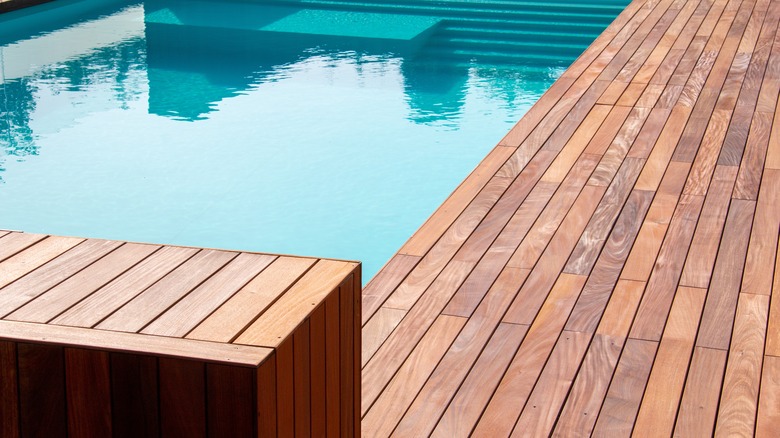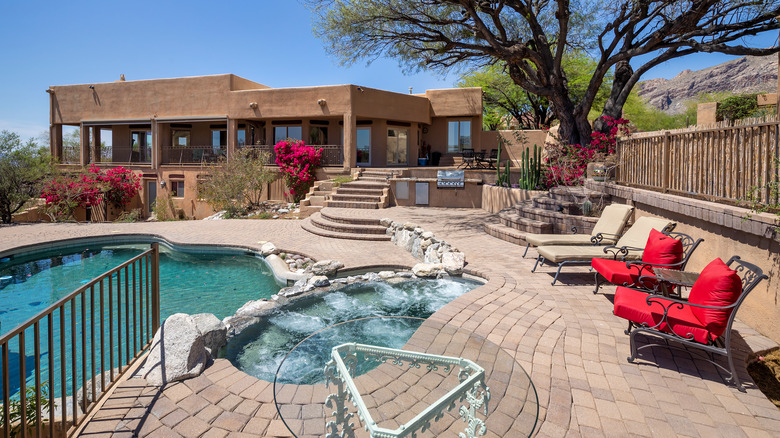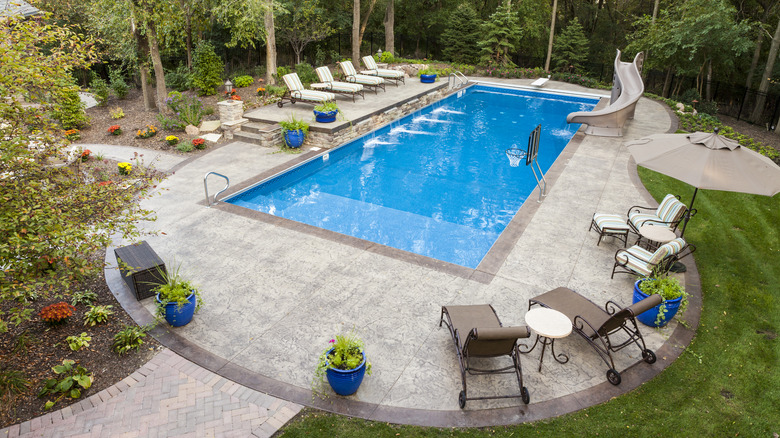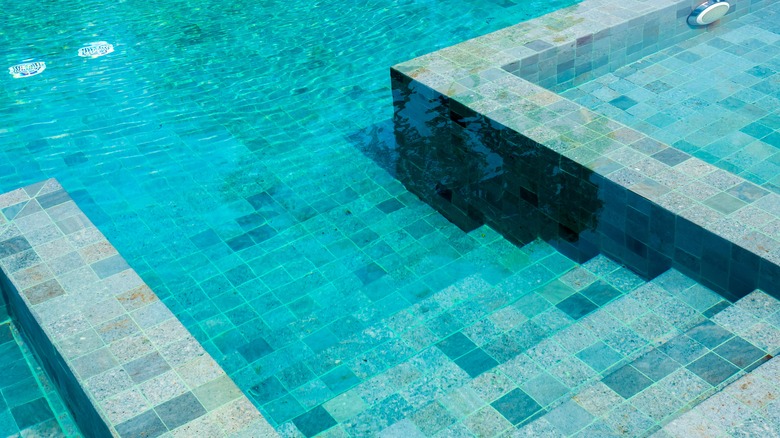What To Think About While Selecting The Material For Your Pool Deck
The pool in your backyard often serves as the focal point of your home's outdoor living area. Therefore, choosing the best pool deck is a crucial decision you'll need to make when designing and building your pool area. Priority should be given to the local climate and environmental aspects, but there are other considerations as well. These factors greatly impact the effectiveness and durability of your chosen material. Hence, you need to choose a sturdy material that can survive the particular elements your location is known for — be it frigid temperatures, high humidity, or severe sun exposure.
Choosing a slip-resistant material is also crucial. Wet surfaces can become slippery, making collisions and injuries more likely. Cost is another important consideration. While spending more money on top-notch material may yield superior long-term value, durability, and aesthetics, less expensive alternatives might also produce good outcomes.
The final factor to take into account when choosing the material for your pool deck is maintenance. Maintenance requirements vary depending on the material, but they must be met in order to maintain your pool deck's beauty and functionality. For some materials to remain in top condition, routine cleaning, sealing, or ad hoc repairs may be necessary. Choose a material that complements your preferences and abilities, while taking into account the time and resources you have available for maintenance. Continue reading as we explore these materials in detail.
Concrete
Concrete is a popular choice for pool decks, and for good reason. It is an adjustable and affordable material that offers numerous pool deck design options. The material offers considerable flexibility in terms of design and can even be stamped or textured to mimic other materials, such as brick or natural stone. Another advantage of concrete is its durability. If installed and maintained properly, your concrete pool deck can last for many years. In particular when using poured concrete, it is extremely simple to clean and needs little upkeep. Furthermore, concrete is often less expensive than other materials, such as pavers or real stone.
There are, however, some disadvantages to take into account. One of the biggest problems with concrete is that it can be slippery when wet, especially if the finish is not textured. For kids in particular, this could be dangerous. Concrete may also crack over time due to extreme temperature changes. While small cracks can often be fixed, larger ones may require more extensive repair work. Finally, despite its durability, a concrete pool deck may eventually show signs of wear and tear and may need to be resurfaced to maintain its appearance.
Brick
Choosing brick for your pool deck offers a host of advantages. One of the most noticeable is the aesthetic appeal. Brick provides a classic, timeless look that can add significant value and charm to your outdoor space. The natural, warm colors of brick can create a welcoming atmosphere around your pool. In addition, bricks are resilient and resistant to severe weather. They come in a variety of colors and are simple to install. Another area where bricks excel is in maintenance. Without completely overhauling the deck, you can just replace a single brick paver if it breaks. In the long term, this simplicity of repair can save you time and money.
There are some drawbacks to take into account, though. Depending on the sort of brick you choose, installing a brick pool deck may be costly. Bricks also require regular sealing to prevent water absorption and ward off damage. Additionally, routine upkeep may be necessary because moss develops on brick, making it slippery. Brick surfaces can also be quite hard, which may make them uncomfortable to walk on barefoot. Lastly, the earthy tones of bricks may limit your color choices compared to other materials. Nevertheless, brick is a great choice for your pool deck if you like the traditional look and are prepared to spend on durability.
Stone
Opting for stone as your pool deck material offers a wealth of benefits. Firstly, stone decks boast an unbeatable natural beauty. Stone has a rich look that is hard to get with other materials, whether you want a sleek, modern look or a rough-hewn, rustic look. With the range of colors, patterns, and textures that are readily accessible, you can create an outdoor space that is actually unique and customized. Stone's durability is another major plus, as are its slip-resistant capabilities, both crucial factors for poolside safety.
However, stone isn't without its drawbacks. Stone can become cold to touch, which is an advantage during hot summer months, but not so great if you live in a cooler climate. Another significant downside is the cost. Stone is often more expensive than other materials. You should also consider maintenance. While stone is durable, it does require regular sealing to maintain its appearance plus prevent water absorption and potential damage from pool chemicals. Furthermore, if a stone paver becomes damaged, it may be more challenging to replace if you need to find a substitute stone that matches the others in size, color, and texture.
Finally, stone is susceptible to corrosion, and some materials, like flagstone, can be pricey. All in all, stone can make a wonderful pool deck if you are prepared to invest in its longevity and maintenance.
Tile
When you opt for tile as your pool deck material, you are choosing a versatile, attractive option. Tiles come in many colors, patterns, and designs, allowing you to create a truly personalized pool area. From simple, minimalist styles to ornate mosaic designs, the aesthetic possibilities with tile are virtually endless. This makes it an excellent choice if you aim for a specific look or theme for your pool area. Your pool deck will look even better if you install and maintain the tile properly. Another advantage of tile is its smooth surface, which can be comfortable underfoot. Specialized pool tiles are also designed to be slip-resistant, easier to clean, and able to withstand harsh temperatures.
However, despite these benefits, there are several considerations to keep in mind. While tile can be beautiful, it can chip or crack due to heavy impact. Furthermore, if you're installing regular tiles, they can be slippery when wet. This can present a safety hazard around a pool where the deck is often wet. Costs for tiles can be higher than other materials and they also require professional installation to ensure adherence to the base surface. Lastly, tile surfaces can become hot in direct sunlight, which may make them uncomfortable to walk on during hot weather.
How wood stacks up against the competition
Due to its warmth, adaptability, and natural beauty, wood is a popular choice for pool decks. It adds a touch of elegance and fosters a welcoming environment. You can stain, paint, or let various types of wood weather naturally, giving you a variety of design options to fit your preferences. However, to keep it in top shape, wood needs frequent maintenance and must be stained or sealed to shield it from moisture and stop warping, splintering, or rotting. It is also susceptible to mildew and algae when exposed to prolonged moisture. In such circumstances, wood may become slippery, so it is crucial to apply a coating to ensure safety.
Select a wood type that is inherently resistant to dampness, insects, and decay. Pine, cedar, and tropical hardwoods like teak are a few of the most common alternatives. Cedar has a charming, hospitable appearance and is inherently resistant to rot and insects, but it might cost more than pine. Teak and other tropical hardwoods are admired for their tenacity and resistance to moisture, insects, and rot. Although they are the priciest option for pool decking, they often produce a beautiful, durable outcome.




